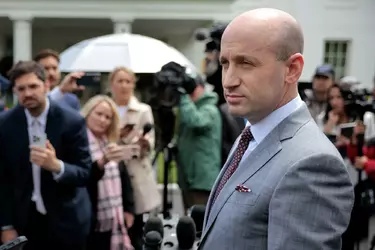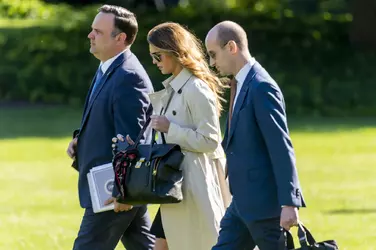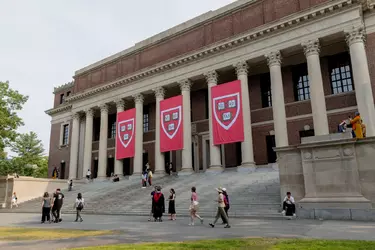 White House Deputy Chief of Staff Stephen Miller Photographer: Chip Somodevilla/Getty Images
White House Deputy Chief of Staff Stephen Miller Photographer: Chip Somodevilla/Getty Images
The Trump White House is moving at a far faster clip in 2025 to remake the federal government and American life, in large part because Stephen Miller has put the agenda on steroids.
Miller, 39, has amassed power and influence through nearly a decade in President Donald Trump’s orbit. Long seen as the driving force behind the West Wing’s immigration policies, Miller is now also leading the campaign to bend the nation’s top universities to Trump’s will.
As deputy chief of staff of policy, he’s still trying to close the US-Mexico border and end the longstanding automatic right to citizenship for babies born in the US — a quest that Miller began working on in Trump’s first term and continued to plan for in the years before regaining the White House. On Friday, the US Supreme Court gave the White House a key early victory in the
birthright citizenship fight, moving the administration a step closer to implementing new restrictions in one of its biggest wins of the second term so far.
“He’s probably as influential as any single person in the White House, and he has earned it by being with Trump since 2015,” Republican former House Speaker Newt Gingrich said.
The Trump White House has gone after Harvard University,
Columbia University and other top schools, claiming they did not do enough to protect Jewish students during pro-Palestinian campus protests or that they discriminated against White students through their diversity initiatives.
 Stephen Miller, deputy White House chief of staff for policy and other aides during a cabinet meeting at the White House.Photographer: Al Drago/Bloomberg
Stephen Miller, deputy White House chief of staff for policy and other aides during a cabinet meeting at the White House.Photographer: Al Drago/Bloomberg
The administration has pulled back federal funding, arrested foreign students and attempted to dictate the makeup of the student body — all part of Miller’s vision to protect Western civilization and return institutions to teaching students basics, says one Trump ally. Last week
University of Virginia President James Ryan said he quit instead of fighting the US government amid a probe of the school’s diversity, equity and inclusion efforts.
Miller’s power within the Trump orbit has grown steadily. He survived the infighting in the inner circle of staff that dominated the first term, he stayed close to Trump during his political exile after the Jan. 6, 2021 Capitol riots and on his comeback presidential bid in 2024.
Now back in the White House, Miller has navigated Trump’s second term by remaining close to Chief of Staff Susie Wiles and her top aides from Florida and officials from previous Trump campaigns. He also had to navigate Trump’s friendship with billionaire Elon Musk, for whom his wife, Katie, works.
Despite his brash public persona, Miller possesses a rare quality in Trump world — the ability to get along with many others and work across factions within the White House.
He came into the Trump orbit as a top aide to Alabama Senator Jeff Sessions, who became US attorney general, and aligned himself with Steve Bannon on immigration. When Sessions fell out of favor, Miller distanced himself and eventually grew close to Ivanka Trump, her husband, Jared Kushner, and Larry Kudlow, the former director of the National Economic Council. In the intervening years, he’s made himself indispensable to Wiles, Donald Trump Jr., Vice President JD Vance and Musk, according to another Trump ally.
“He is skilled at playing the inside political game,” says Marc Short, the White House legislative affairs director during Trump’s first term. “He is very passionate about his issues like immigration, yet at the same time, he is incredibly deferential to the president. He knows not to get in front of the president on those issues.”
It helps he was there from beginning. Short remembers arriving at Trump Tower in 2016 after Trump selected Mike Pence as his running mate. The only other aides there were Hope Hicks and Miller. “It’s not like he is new to the Trump inner circle,” Short says. “He’s been there since the inception of the phenomenon.”
 From left, Former White House Social Media Director Dan Scavino, Former Counselor to the President Hope Hicks, and Stephen Miller in 2020.Photographer: Andrew Harnik/AP Photo
From left, Former White House Social Media Director Dan Scavino, Former Counselor to the President Hope Hicks, and Stephen Miller in 2020.Photographer: Andrew Harnik/AP Photo
Miller did not respond to requests for comment. White House Press Secretary Karoline Leavitt said in a statement that “Stephen Miller is one of President Trump’s most trusted and longest serving aides for a reason - he delivers.”
Miller Spent Years at Duke
Miller’s disdain for top schools was informed by his own college experience at
Duke University in the late 2000s, according to one Trump ally. As a student, he wrote
op-eds for the school newspaper and covered the 2006 case of a Black woman who falsely accused three white Duke lacrosse players of rape. The case garnered national media attention, with narratives built around race and class.
Since then, Miller has held the view that America’s top schools have become too focused on diversity, sex, politics and religion and were not acting in the nation’s best interests, say Trump allies. He wrote a critique of liberal professors for the Duke newspaper in 2007, titled “A Portrait of Radicalism.”
Top Trump aides talked about taking on higher education in the first term, batting around the idea of taking away the schools’ tax exempt status — a move they’ve tried recently with Harvard. But aides could never coalesce around the best idea to present to Trump.
Then the Covid crisis hit the country, consuming all of the White House’s time while Trump was seeking reelection — and lost to Joe Biden.
Miller was one of the few aides who believed Trump would eventually return to power, and he incubated many of his culture-war ideas at America First Legal, a think tank he founded to hone their legal strategies for pet issues of immigration, higher education and other culture wars.
Joining the Campus Battle
Now roughly five months into Trump’s second term, the war on the Ivy League has become a cornerstone of Trump’s agenda that few outside of the Trump inner circle saw coming.
After October 7, 2023, when
Hamas attacked
Israel and took dozens hostage, campus protests critical of Israel’s military response left many Jewish students feeling unsafe on their own campuses, giving Miller the fuel he needed. It became part of Trump’s larger fight against diversity and inclusion programs, transgender athletes in school sports and antisemitism.
In the White House, Miller, the director of the White House policy council Vince Haley, senior policy strategist May Mailman and former White House attorney Gene Hamilton have led the charge to take on Harvard and other universities.
Mailman, a Harvard grad, has been negotiating with Harvard directly to restore its federal funding. Several other government agencies including the Department of Justice, Health and Human Services, Education and GSA are also heavily involved. Because they believe the country’s institutions and leaders are too liberal, they went directly to the nation’s most prestigious schools to squelch progressive ideas.
Trump advisers say the end goal is to withhold federal funding from Harvard and other schools until Harvard agrees to conditions about spending federal money — on research rather than the administration, or other activities viewed as partisan or hostile to conservatives. The White House also would like to negotiate rules for the conduct of students and faculty at schools, which accept federal funding.
 The Widener Library on the Harvard Campus in Cambridge, Massachusetts, on June 4.Photographer: Cassandra Klos/Bloomberg
The Widener Library on the Harvard Campus in Cambridge, Massachusetts, on June 4.Photographer: Cassandra Klos/Bloomberg
Critics say their aims violate the First Amendment and threaten academia’s independence.
“They will feel this pain if they lose these federal funds. They have many programs that are funded directly by the federal government that will not continue if they do not change their behavior and change their behavior quickly,” Miller
said on Fox News a few months ago. “We will use every tool we have.”
Already, there are signs the White House’s strategy is working to bend elite universities to Trump’s will. Harvard is trying to negotiate with the White House to restore its federal funding of more than $2 billion — though it seems like a resolution remains far off. Columbia University or Cornell appear closer toward reaching an agreement.
It’s all evidence that Miller’s approach of trying to change the country’s trajectory on everything from immigration to courts to universities to K-12 education is taking hold.
“Children will be taught to be patriots. Children will be taught civic values for schools that want federal taxpayer funding,” Miller warned at a
May 1 briefing at the White House.





